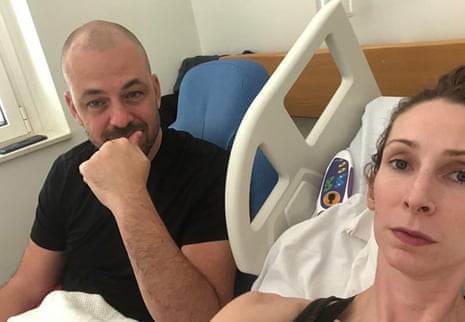Doctors have denied an American woman on holiday in Malta a potentially life-saving abortion, despite saying her baby had a “zero chance” of survival after she was admitted to hospital with severe bleeding in her 16th week of pregnancy.
Despite an “extreme risk” of haemorrhage and infection, doctors at the Mater Dei hospital in Msida told Andrea Prudente that they would not perform a termination because of the country’s total ban on abortion.
Prudente and her husband are seeking a medical transfer from Malta to the UK, which the couple say is their only option due to the risk to her life. They claim medical staff were uncooperative in their attempts to leave and in sharing medical records with the couple’s insurance company.
“I just want to get out of here alive,” Prudente told the Guardian from her hospital room in Malta’s capital, Valletta. “I couldn’t in my wildest dreams have thought up a nightmare like this.”
Activists in Malta say the case has alarming echoes of the treatment of Savita Halappanavar, who died of sepsis in an Irish hospital in 2012 after doctors refused a request to terminate her pregnancy when she began to miscarry at 17 weeks, due to the abortion ban that was in place in Ireland then.
Malta is the only country in the EU to ban abortion under any circumstances. The only options for those seeking to end a pregnancy on the island nation are to buy illegal abortion medication online or seek a termination overseas.
Prudente, 38, was on holiday with her partner, Jay Weeldreyer, 45, on the island of Gozo on 12 June when she began bleeding heavily in the night.
Doctors in Gozo prescribed her a drug to protect against miscarriage, but two days later when they were back on Malta, the main island, Prudente’s waters broke and she was admitted to St Thomas hospital, where she was told that her placenta had become partially detached.
A follow-up ultrasound 48 hours later found there was no amniotic fluid left in her womb, and the couple were told the baby could not survive. They were also told that because of Malta’s abortion law, there was nothing doctors could do to end the pregnancy as long as the foetus had a heartbeat.
Prudente was transferred to Mater Dei hospital, where she was additionally diagnosed with a ruptured membrane and an umbilical cord that was protruding from her cervix, putting her at even greater risk of haemorrhage and infection. She also tested positive for Covid-19. She is being kept in Covid isolation and receiving antibiotics to ward off infection.
Weeldreyer said medical staff came to check for a foetal heartbeat every day.
“It’s an inconceivable form of emotional and psychological torture,” he said. “Part of me still celebrates hearing the heartbeat … and at the same time, I don’t want that heartbeat there because this is just leading to more suffering for this woman that I love.”
Lara Dimitrijevic, founder of Malta’s Women’s Rights Foundation and the lawyer representing Prudente, said the hospital only provided medical records after she intervened, which has delayed a transfer to the UK.
“It took a day for Andrea to receive her file and we are dealing with an emergency situation,” she said. “Every minute could lend itself to putting Andrea’s life in danger.”
Mater Dei hospital confirmed that it had given Prudente access to her file, but did not comment further on the case. No comment was forthcoming from the government or the ministry for health.
Prudente said the current advice from Maltese medical staff was for her to leave the hospital and wait at the couple’s hotel for the foetus’s heartbeat to stop or for Prudente to develop an infection, after which they could intervene.
“I feel like I’m being actively traumatised,” she said.
The Women’s Rights Foundation filed a judicial protest last week on behalf of 188 women, claiming the Maltese government’s blanket ban on abortion breached their right to health, privacy and equality. The foundation is now preparing to launch a case challenging the constitutional ban.
Weeldreyer said the couple had no idea that Malta had an abortion ban when they booked the holiday, intended to be a “babymoon”, where they could spend time on a Mediterranean island before the birth of their first child together.
Prudente said she was “desperate” to get off the island and receive appropriate medical care, but also wanted to raise awareness of the situation in Malta to prevent others suffering in the way that she had.
“I don’t want this to happen to more people,” she said.
